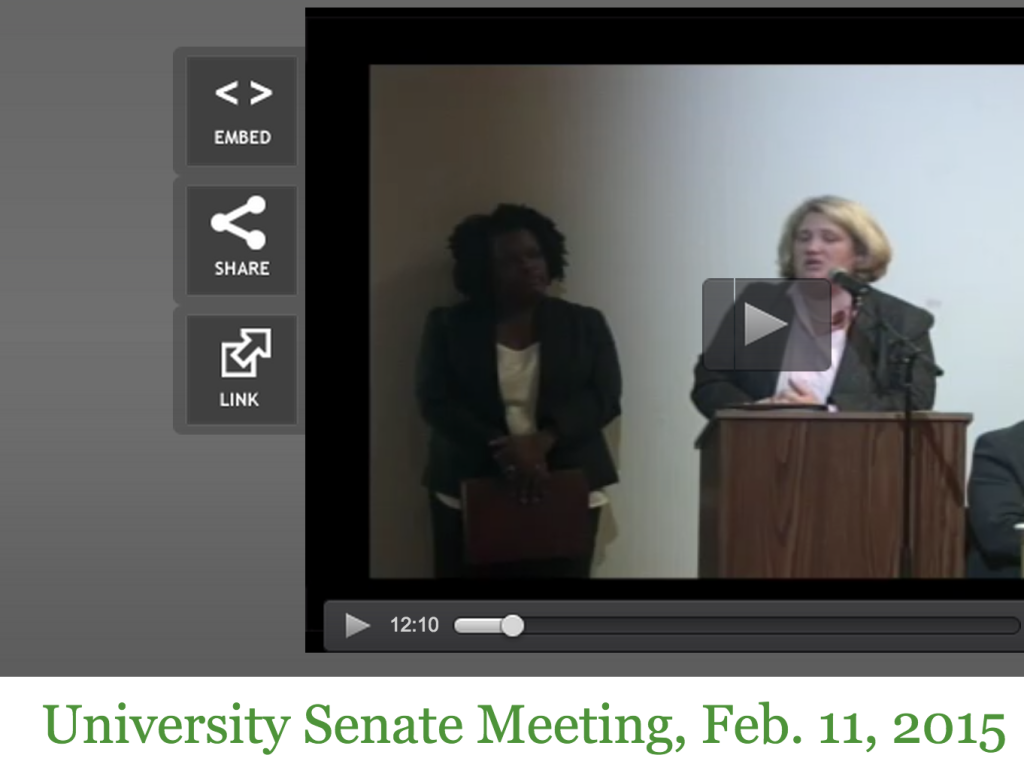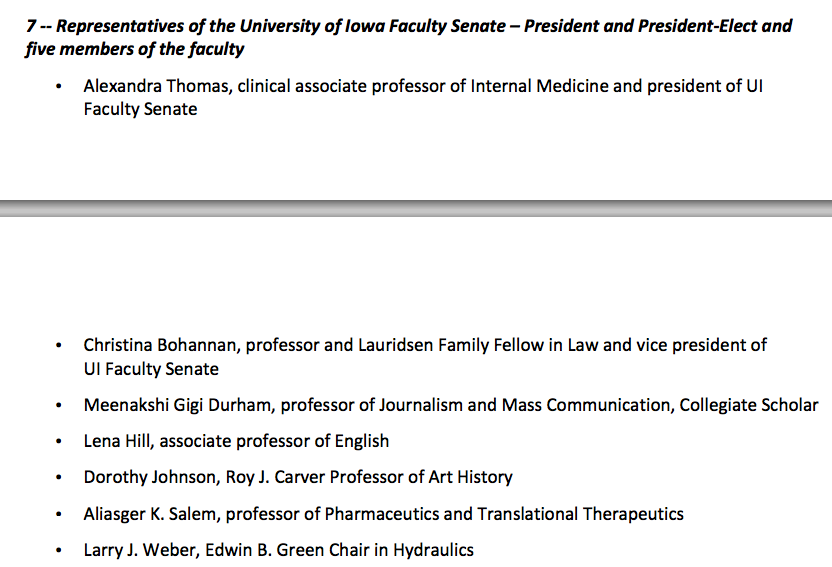President Schill was hired by Board Chair Chuck Lillis after a closed search (which additionally minimized faculty input, and gave Lillis sole power to pick the one finalist.) This report from the Brechner Center for Freedom of Information is the first attempt I’ve seen to examine the consequences of such…
Posts tagged as “Presidential search”
4/10/2018 repost, for no particular reason. 6/8/2014: Rumor down at the faculty club is that Gottfredson and Berdahl are closeted in McMorran House, working on a strategy to convince the Trustees to give Gottfredson another chance. From the meeting packet here: June 12, 12:00 pm: Trustees roundtable discussion with Bob Berdahl Ford Alumni Center, Room 403 Presumably Berdahl will be introduced to the board as former…
This would be U of Iowa President J. Bruce Harreld, speaking at a staff meeting. The Chronicle has the story here. Apparently Mr. Harreld, a former businessman, consultant, and HBS adjunct, also believes there is only “one way” to prepare lessons. Harreld was brought to Iowa by Parker Search, the same firm…
Parker Executive Search, the same firm that ran UO’s search, is in charge. In comparison to UO, the Iowa search team had a full complement of faculty, selected by the faculty senate and not by the administration. And they’re bringing 4 candidates to campus, including the sitting president of Oberlin…
4/15/2015 updates: Schill on shared governance, from his 2013 interview at UW-Madison, here: 5. Previous chancellors of this university have had contentious relations with the Faculty Senate. Assuming that natural tension between Fac Senate and the Chancellor’s office exists, how do you expect to relate with faculty politically? There is…
Rich Read of the Oregonian interviews search Chair Connie Ballmer: … Conceivably, the board could toss out all four finalists and instruct the search committee to conduct another round of recruitment and requests for nominations. But Ballmer said search committee members “feel great” about the current four finalists, and she…
Not clear how many will also be applying for the U of Iowa job – a competing search also run by Parker. From a helpful member of the sham Advisory Committee, which will not get to meet the candidates, or even meet with the real Search Committee, before the BOT…
Update: I’ve been told that Laurie Wilder asked the UO Board for permission to get involved in a second search.
3/19/2015: She seemed so honest, when she talked to the Senate that afternoon:
3/19/2015 update: I distinctly remember Parker Executive Search’s President Laurie Wilder saying, while sitting there with Connie Ballmer, that UO would get an exclusive: Parker would not take on another presidential search for an AAU university while they were working on the UO search.
But last week the Daily Iowan reported that the University of Iowa had also hired Parker to find them a new president, also in February, for $200K + expenses:
The search for the next University of Iowa president will soon be in full swing.
Jean Robillard, the UI vice president for Medical Affairs and head of the Presidential Search Committee, announced at the state Board of Regents meeting in Iowa City on Wednesday that the panel would have its first meeting on March 25. …
Regent President Bruce Rastetter said the committee’s first official meeting with Parker Executive Search — a firm the regents hired whose duty is to define the goals of the search, develop specifications for the presidential position, create a timeline, and be heavily involved in the interview process — will mostly likely take place in late April or early May. …
The regents announced they had chosen Parker in mid-February.
Iowa has been in the AAU since 1909, so I see three possibilities:
- Laurie Wilder lied to the UO faculty and Ms Ballmer,
- UO was kicked out of the AAU in February, or
- the Board picked a new President in February and they forgot to tell the faculty.
UO’s search has been botched from day one, when Chuck Lillis snuck secret rules, with minimal faculty participation past the board. Faculty Trustee Susan Gary should have helped him avoid the resulting embarrassment, but she was asleep at the wheel as usual, and isn’t even on the search committee.
The Iowa search committee has 21 members. Seven of them are faculty, including the president and president elect of their faculty senate:
There are also two students – undergraduate and graduate. Chuck Lillis’s search committee has no students, and more Moffitts than faculty.
Maybe it’s time for the Board to give it up, and beg Coltrane to keep the job?
2/11/2015 update on 9AM search meeting. Trustee Connie Ballmer, Parker princip Laurie Wilder, some people from the search committees. Only others were me and maybe 2 other faculty, one or two OA’s and staff, and Diane Dietz and RG photographer Chris Pietsch.
I have to say that I was surprised and impressed by Ms Ballmer’s and Ms Wilder’s willingness to answer some tough questions. Wilder got into the nuts and bolts of what candidates ask her (e.g. what sort of board does UO have? Control-freaks, laissez-faire, etc.) The Senate is not going to like some of the answers we’re going to get this afternoon about the process, but personally, I’m no longer quite as paranoid about the likely outcome.
2/10/2015: UO Board’s Parker Executive Search firm is not exactly top shelf
With the UO Trustees on the lookout for a new president, a reminder of the snake-oil salesmen that will likely be applying for the job seems in order. The NYT has a hagiographic piece by Kevin Carey on former president Stephen Trachtenberg and the rise of George Washington University, here:…
Update: Scott Greenstone has a brief report in the ODE, here, with a subhead that pretty much captures how little JH has done on sexual violence prevention: Coltrane promises the UO is deciding how to fight sexual assault President Coltrane, do we have your firm commitment on your promise to…
2/9/2015 reminder: Two of the Parker principals, Laurie C. Wilder, President, and Porsha L. Williams, Vice President, will be on campus Wednesday to answer questions about the Presidential Search:
9-10 in the Law School’s 4th floor Lewis Lounge room, then 3-4 at the Senate meeting.
Lewis Lounge holds about 40, so if you get there early please save me a seat.
This search has been in trouble since the day Chuck Lillis and Angela Wilhelms snuck a motion by the board giving Lillis sole authority to pick one finalist. We’ll see if Parker can explain the plan to save it.
2/6/2014: The New York Times has a story on a problematic previous search by this firm, for Rutgers, here.
The full document is here. My take on it is very positive guarded. It emphasizes the need to stay in AAU, gets specific, emphasizes scholarship and even mentions transparency. On the other hand, as a commenter notes, it opens the door to hiring a president with no academic qualifications or experience:…
11/6/2014: Trustees to appoint Duck Athletic Director Rob Mullens as next UO President
Diane Dietz has the story in the RG, here. I know I’ve written a few unkind words about Dr. Mullens in the past, but let me be the first to say that I believe he has the necessary fundraising connections, and an unusually creative mind when it comes to finances and academic matters.
11/3/2013 Update: UO Trustees ask The People’s help in choosing next Great Leader
News reports on Task Force recommendations: Alexandra Wallachy in the Daily Emerald: University Senate was action-packed and attendance-packed at its meeting on Wednesday, Oct. 22. The Senate Task Force to Address Sexual Violence and Survivor Support co-chair Carol Stabile presented the task force’s recommendations at the meeting held in Lawrence…
Update: Board Secretary Angela Wilhelms has now sent out these docs, here. Chuck Triplett tried to keep me and a reporter from getting these photos of this public record, which was not distributed to the public. We ignored him:

